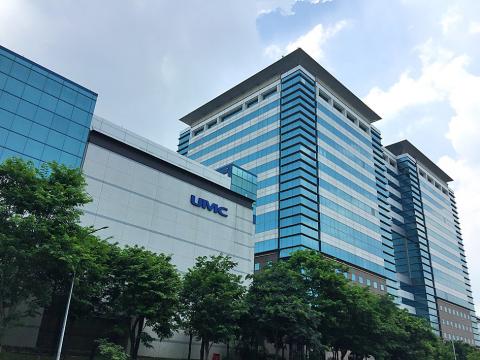United Microelectronics Corp (UMC, 聯電), the nation’s second-largest contract chipmaker, and three of its employees were on Wednesday indicted for alleged theft and use of trade secrets from Micron Technology Inc’s local units in the latest row over escalating talent poaching.
UMC, Ho Chien-ting (何建廷), Wang Yong-ming (王永銘) and Rong Le-tien (戎樂天) allegedly illegally replicated Micron’s manufacturing techniques for the profit of UMC businesses in China, the Taichung District Prosecutors’ Office said in its indictment.
UMC is developing DRAM chip manufacturing technologies in collaboration with China’s Fujian Jin Hua Integrated Circuit Co (晉華集成電路) via a Chinese subsidiary.

Photo: Hung Yu-fang, Taipei Times
UMC and its employees contravened the Trade Secrets Act (營業秘密法) and the Copyright Act (著作權法), prosecutors said.
In a filing with the Taiwan Stock Exchange on Wednesday, UMC said it had not received official notification of the indictment.
UMC would fully cooperate with any investigation and would hire lawyers to safeguard its interests, it added.
Micron said it aims to protect its intellectual property through the lawsuits.
The government’s enforcement of related rules would assure foreign investors who are interested in investing in Taiwan that their properties and interests would be fully safeguarded, it added.
Ho and Wang are former employees of Micron’s local unit, where Ho was a section chief and Wang a manufacturing deputy manager.
In November 2015, Ho joined UMC as technical manager for special projects.
Wang followed suit in March last year, joining UMC as a technical manager for components.
Ho stole classified trade secrets from Micron and used them at UMC, helping a UMC subsidiary in China manufacture memorychip wafers, prosecutors said.
Wang is suspected of stealing manufacturing technology and protocols, which he gave to Rong, a UMC technical division associate, to speed up the design of UMC’s process protocol, prosecutors said.
Micron in February filed a lawsuit after discovering that Wang had made electronic copies of company files, which he allegedly handed over to UMC.
Later that month, prosecutors raided UMC’s Tainan plant.
After learning about the search, Rong reportedly instructed Ho and Wang to delete all related information from the company’s database.
When questioned by prosecutors, Ho and Wang claimed that they took the data for personal research, while Rong said he only made suggestions to Wang on manufacturing design.

PREPAREDNESS: Given the difficulty of importing ammunition during wartime, the Ministry of National Defense said it would prioritize ‘coproduction’ partnerships A newly formed unit of the Marine Corps tasked with land-based security operations has recently replaced its aging, domestically produced rifles with more advanced, US-made M4A1 rifles, a source said yesterday. The unnamed source familiar with the matter said the First Security Battalion of the Marine Corps’ Air Defense and Base Guard Group has replaced its older T65K2 rifles, which have been in service since the late 1980s, with the newly received M4A1s. The source did not say exactly when the upgrade took place or how many M4A1s were issued to the battalion. The confirmation came after Chinese-language media reported

The Taiwanese passport ranked 33rd in a global listing of passports by convenience this month, rising three places from last month’s ranking, but matching its position in January last year. The Henley Passport Index, an international ranking of passports by the number of designations its holder can travel to without a visa, showed that the Taiwan passport enables holders to travel to 139 countries and territories without a visa. Singapore’s passport was ranked the most powerful with visa-free access to 192 destinations out of 227, according to the index published on Tuesday by UK-based migration investment consultancy firm Henley and Partners. Japan’s and

A Ministry of Foreign Affairs official yesterday said that a delegation that visited China for an APEC meeting did not receive any kind of treatment that downgraded Taiwan’s sovereignty. Department of International Organizations Director-General Jonathan Sun (孫儉元) said that he and a group of ministry officials visited Shenzhen, China, to attend the APEC Informal Senior Officials’ Meeting last month. The trip went “smoothly and safely” for all Taiwanese delegates, as the Chinese side arranged the trip in accordance with long-standing practices, Sun said at the ministry’s weekly briefing. The Taiwanese group did not encounter any political suppression, he said. Sun made the remarks when

BROAD AGREEMENT: The two are nearing a trade deal to reduce Taiwan’s tariff to 15% and a commitment for TSMC to build five more fabs, a ‘New York Times’ report said Taiwan and the US have reached a broad consensus on a trade deal, the Executive Yuan’s Office of Trade Negotiations said yesterday, after a report said that Washington is set to reduce Taiwan’s tariff rate to 15 percent. The New York Times on Monday reported that the two nations are nearing a trade deal to reduce Taiwan’s tariff rate to 15 percent and commit Taiwan Semiconductor Manufacturing Co (TSMC, 台積電) to building at least five more facilities in the US. “The agreement, which has been under negotiation for months, is being legally scrubbed and could be announced this month,” the paper said,